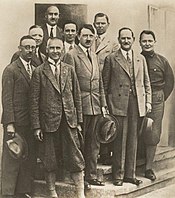Gau Saxony
| Gau Saxony | |||||||||||
|---|---|---|---|---|---|---|---|---|---|---|---|
| Gau of Nazi Germany | |||||||||||
| 1925–1945 | |||||||||||
 Map of Nazi Germany showing its administrative subdivisions (Gaue and Reichsgaue). | |||||||||||
| Capital | Dresden | ||||||||||
| Government | |||||||||||
| Gauleiter | |||||||||||
• 1926–1945 | Martin Mutschmann | ||||||||||
| History | |||||||||||
| 16 May 1925 | |||||||||||
| 8 May 1945 | |||||||||||
| |||||||||||
| Today part of | Germany Poland | ||||||||||
The Gau Saxony (German: Gau Sachsen) was an administrative division of Nazi Germany from 1933 to 1945 in the German state of Saxony. Before that, from 1925 to 1933, it was the regional subdivision of the Nazi Party in that area.
History

The Nazi Gau (plural Gaue) system was originally established in a party conference on 22 May 1926, in order to improve administration of the party structure. From 1933 onward, after the Nazi seizure of power, the Gaue increasingly replaced the German states as administrative subdivisions in Germany.[1]
At the head of each Gau stood a Gauleiter, a position which became increasingly more powerful, especially after the outbreak of the Second World War, with little interference from above. Local Gauleiters often held government positions as well as party ones and were in charge of, among other things, propaganda and surveillance and, from September 1944 onward, the Volkssturm and the defense of the Gau.[1][2]
Gau Saxony was established on 16 May 1926 by the merger of Gau Saxony and Gau East Saxony. The position of Gauleiter in Saxony was held by Martin Mutschmann from its formation in 1926 to 1945.[3][4] Mutschmann, a powerful figure in Nazi Germany and well connected to Adolf Hitler, was arrested by German police shortly after the war and handed over to the Soviet Union. He was incarcerated in the Lubyanka prison in Moscow, tried and executed there on 14 February 1947.[5]
The Jewish and Polish inhabitants of the province were persecuted. In 1938, the Polish Jews were expelled, however, the Polish Consulate in Leipzig sheltered 1,300 Polish Jews, preventing their deportation.[6] During the German invasion of Poland at the start of World War II, in September 1939, the Gestapo carried out mass arrests of Polish activists in Dresden and Leipzig,[7] and seized the Polish Consulate in Leipzig and its library, which was a violation of international law.[6] In 1941, the American Consulate in Leipzig was also closed by order of the German authorities.[8] Numerous subcamps of the Buchenwald, Flossenburg and Gross-Rosen concentration camps were operated in the province.[9][10][11]
See also
- Gauliga Sachsen, the highest association football league in the Gau from 1933 to 1945
References
- ^ a b "Die NS-Gaue" [The Nazi Gaue]. dhm.de (in German). Deutsches Historisches Museum. Retrieved 26 March 2016.
- ^ "The Organization of the Nazi Party & State". nizkor.org. The Nizkor Project. Archived from the original on 9 November 2016. Retrieved 26 March 2016.
- ^ "Übersicht der NSDAP-Gaue, der Gauleiter und der Stellvertretenden Gauleiter zwischen 1933 und 1945" [Overview of Nazi Gaue, the Gauleiter and assistant Gauleiter from 1933 to 1945]. zukunft-braucht-erinnerung.de (in German). Zukunft braucht Erinnerung. Retrieved 26 March 2016.
- ^ "Gau Sachsen" [Gau Saxony]. verwaltungsgeschichte.de (in German). Retrieved 26 March 2016.
- ^ "Mutschmann, Martin". deutsche-biographie.de (in German). Bavarian State Library. Retrieved 26 March 2016.
- ^ a b "70 lat temu polski konsul pokrzyżował plany nazistów". dw.com (in Polish). Retrieved 22 June 2024.
- ^ Cygański, Mirosław (1984). "Hitlerowskie prześladowania przywódców i aktywu Związków Polaków w Niemczech w latach 1939–1945". Przegląd Zachodni (in Polish) (4): 54.
- ^ "Brief history". U.S. Embassy & Consulates in Germany. 18 April 2018. Archived from the original on 6 October 2022. Retrieved 22 June 2024.
- ^ "Buchenwald war überall". aussenlager-buchenwald.de (in German). Retrieved 22 June 2024.
- ^ "Subcamps". KZ-Gedenkstätte Flossenbürg. Retrieved 22 June 2024.
- ^ "Subcamps of KL Gross-Rosen". Gross-Rosen Museum in Rogoźnica. Retrieved 22 June 2024.
External links


